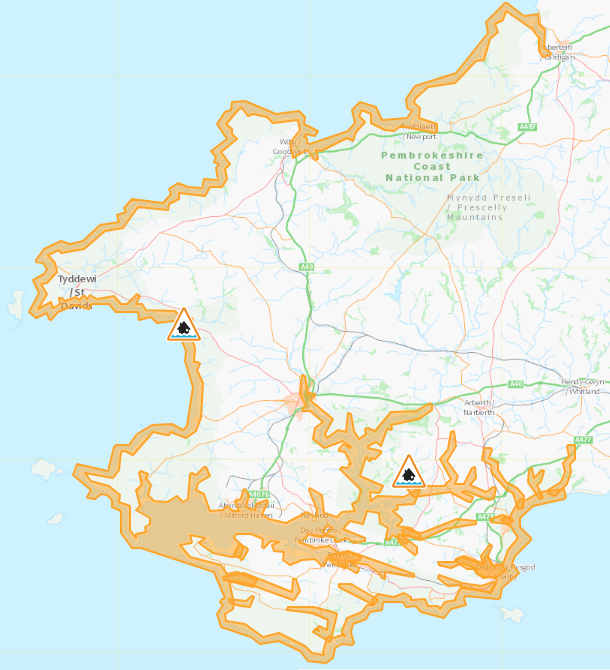News
How Pembrokeshire’s beaches were used as practice for the world’s biggest invasion

TODAY marks the 80th anniversary of D-Day, when the Allied forces landed on the beaches of Normandy, France as part of Operation Overlord; a concerted and successful attempt to liberate Europe from the grip of German occupation under Hitler.
The invasion of Normandy (codenamed Operation Neptune) was a massive amphibious assault involving 7,000 ships and 11,000 aircraft. A decoy plan, Operation Fortitude, led the Germans to believe the main target was Pas de Calais. It was a major milestone in securing victory for the allied forces.

Tenby, Saundersfoot, Amroth and Laugharne had already experienced their own version of the Normandy landings – in practice form.
Our local beaches were the location for an extensive two-week-long practice, Operation Jantzen. The exercise commenced on July 22, 1943, and was, thankfully, the only land invasion of Wales during World War II.
Under the watchful eyes of Winston Churchill and Lord Mountbatten (rumour has it that Eisenhower also attended), 100,000 American, Australian, British and Canadian forces had a rare opportunity to practice every element needed for a successful attack on “Fortress Europe”, this involved the initial landings, the setting up of Headquarters and even the moving and stockpiling of vital supplies that would be needed by troops on the front line.
Newsreel footage clearly shows trucks somehow being driven onto flat-bottomed transports in preparation for the training excercise on Tenby Beach, a beach more commonly associated with bathing, swimming and making sandcastles.
The Regimental War Chronicles of the Oxfordshire & Buckinghamshire Light Infantry Vol3 1942-1944 records that the First Bucks Battalion had been training in Ayrshire before moving to West Wales.
The road convoy of over 200 vehicles left Ayr on the July 8, 1943, and the main body departed by train three days later. Troops disembarked at Haverfordwest station, where three-ton lorries lifted them to Picton Park.
Picton Park, consisting of Nissen huts and tents, provided an excellent concentration area and preparations for Exercise “Jantzen,” due to start on the July 17, were pressed forward.
All was ready, but the exercise was postponed owing to bad weather, and the move to the assembly area at Cresselly did not begin until July 20.
The area allotted to No. 6 Beach Group consisted of the village of Saundersfoot and its immediate hinterland. There were two small beaches and a tiny port, and the country behind the beaches was hilly and heavily wooded, with narrow country lanes.
No. 5 Beach Group had an equally difficult area some miles to the east with a steep, shingle bank at the head of the beach which made exits and entrances serious problems.
The first key plan prepared before the exercise needed little adjustment and the deployment of thousands of men and hundreds of vehicles and guns proceeded most smoothly.
Coasters and barges were loaded at Tenby and beached at Saundersfoot on a falling tide.
Stores were unloaded first to barge and then to lorry, and, when the coasters had dried out, direct to lorry. Folding boats were not used and the DUKW had still not made its appearance.
On August 5 (D+14) the exercise was closed.
A great many lessons had been learned from “Jantzen.” The organisation and training of the group were sound. The complicated deployment drill had worked smoothly although it had been shown how vulnerable any beach organisation is to deterioration in the weather.
The effort was not only limited to troop movements.
The first major supply exercise involving barges (36 in 3 flotillas), 36 coasters and other forces, took place at Tenby, South Wales in July/August 1943 in Exercise “Jantzen”.
As part of the preparation for sailing across the English Channel for the Normandy landings, “dumb” Thames River barges sailed from the south coast of England around Land’s End and across the Bristol Channel under their own power.

The barges acted as kitchen vessels and troop transports during the exercise.
They subsequently made even longer coastal voyages over to Normandy as supply vessels.
The beaches of west Wales were chosen because they mimicked the conditions of Normandy being a mixture of salt flats, shingle and wide sandy areas overlooked by dunes. In addition, earlier in the war some of them had been extensively fortified and defensive measures put in place as part of the preparations for invasion.
The importance of experiencing the ‘draft’ of landing beaches was vitally important as were the changing tidal conditions around the West Wales coast.
The area’s roads were also used to give troops experience of moving along thin, rural roads with heavy armour like Tanks and Armoured Troop Carriers.
Speaking to the BBC in 2007, Bentley Howell, whose family lived at Wiseman’s Bridge Inn at the time, remembered some of the events surrounding Operation: Jantzen.
“My half-brother, who was about 40 years old, was at the time the licensee of the Wiseman’s Bridge Inn, Permbrokeshire. In his old age, he used to tell me of his wartime memories and particularly about the day that Winston Churchill called in for a pot of tea.
“A full scale invasion landing practice took place, involving up to 100,000 men, DUKW’s, other landing craft, and troopships disgorging their loads onto the sands of the Saundersfoot bay.
“The publican, John Henry Mathias, or ‘Jack the Bridge’ as he was affectionately known, was appointed a Coastguard because of his local knowledge, and although the whole area had been sealed off for security reasons and a 10pm curfew imposed, Jack was exempt from this and wandered at will.
“Officially, the troops were not allowed to drink, but for 1s 6d they had all they could eat – home killed ham, eggs, fried bread and apple tart. Jack entertained them with tales of a ghostly monk who roamed the tunnels between Saundersfoot and Wiseman’s Bridge.
“One day, several large staff cars swept down the narrow lane to the pub. It was about 3pm, but in those days the pub was open all hours. A blonde woman in an ATS uniform carried out ‘a plain Welsh tea’ to the party of about 15 high ranking officers – later it was learned that she was Sarah Churchill; Winston Churchill surveyed the troops on the beaches together with Admiral Viscount Mountbatten. It was rumoured that Eisenhower was also present”.
For several years after the War, the letter signed by Churchill, thanking the licensee for his hospitality hung on the wall in the pub premises.
In fact, the rumours about Eisenhower’s presence in Pembrokeshire were true, but not quite in the way supposed.
The late and much-missed Vernon Scott wrote in his book An Experience Shared: “Had residents been told on the first day of the fourth month of 1944 that the Supreme Allied Commander, General Dwight D Eisenhower, was in Pembroke Dock, they would have surely dismissed it as an April Fool leg pull. But America’s top soldier in the European Theatre of Operations, really was in the area.”
Eisenhower came to west Wales to inspect the men of the 110th Infantry Regiment, at that time based at Llanion Barracks in Pembroke Dock.
By April 1944, the Regiment was going through last-minute training for the Normandy landings and push for victory.
The Supreme Commander Allied Forces’ visit came as a surprise to the GIs stationed in the County. ‘Ike’ arrived in secrecy at Tenby and was whisked to Pembroke Dock in a staff car kitted out with miniature stars and stripes for the occasion.

The GIs called Pembroke Dock ‘Blitz Ville’, surprised at the extent of the bomb damage in such a small town on the far fringes of Wales.
Pembrokeshire wears its battle-scars proudly, from the huge castles built hundreds of years ago to suppress the native Welsh, to the fuel depots, RAF airfields and anti-aircraft gun bases that were literally thrown up around the county to help protect Great Britain from the power of the Nazi war machine.
The south of the county bore the brunt of Hitler’s wrath. On August 19, 1940, a fuel depot at Llanreath, Pembroke Dock, was bombed by the Luftwaffe. The resulting fire spewed thick, black, oily smoke into the blue skies of Pembrokeshire for 18 days.
The dense plume of smoke could be seen from as far away as the North Devon coast and the fire claimed the lives of 5 Cardiff-based firemen who had been sent down to help deal with the raging inferno as an estimated 100,000 gallons of oil burned.
600 German prisoners of war were also imprisoned in Pembrokeshire during the conflict, with many being placed at local farms to plough, plant and help the Allied war effort ‘dig for victory’.
Looking around today, it’s hard to imagine the full military might of the Allies being put through their paces on our beaches, but our county’s role as a staging area for the biggest naval landing in human history cannot be underestimated
Community
Wales launches plan to become ‘Carer Aware’ nation

Consultation invites unpaid carers across the country to shape new national strategy
THE WELSH GOVERNMENT has unveiled plans to make Wales a “Carer Aware” nation, with a new public consultation launched today (Monday, Feb 2) aimed at improving recognition and support for the country’s thousands of unpaid carers.
Ministers say the move is designed to ensure people who look after relatives, friends or neighbours are identified earlier and treated as partners in decisions about the care of their loved ones.
A draft National Strategy for Unpaid Carers has been developed with input from hundreds of carers and representative groups across Wales. It sets out eight key priorities, including better recognition of carers’ roles, improved access to respite and short breaks, stronger wellbeing support, and measures to prevent young carers from carrying too much responsibility.
Under the proposals, carers of all ages and backgrounds — including disabled carers and those in minority communities — would be able to access clear, local information and help when they need it.
Officials say earlier identification is critical, so carers can receive advice, financial guidance and emotional support from the start of their caring journey, rather than only at crisis point.
The strategy also stresses the need for sufficient alternative care arrangements to allow carers time to rest and protect their own health.
Dawn Bowden, Minister for Children and Social Care, said many carers do not even see themselves as carers.
“Too often, unpaid carers go unrecognised – even by themselves. They’re simply ‘looking after mum’ or ‘helping out a friend’, but caring can have a profound impact on people’s finances, careers, health and wellbeing,” she said.
“We want Wales to be a place where carers are identified early, where they know their rights, and where they’re treated as partners for the person they care for.
“This consultation is important in shaping a strategy which takes into full account how carers feel and how they’re supported. I’d encourage everyone with an interest to provide their views.”
The consultation is open now and runs until April 13, with responses helping to shape the final strategy and future support services across Wales.
People can take part online via the Welsh Government website.
News
Bus services reform becomes law across Wales

Landmark legislation gives public sector greater control as rollout set to begin in southwest Wales in 2027
LOCAL bus services across Wales are set for their biggest overhaul in decades after new legislation formally became law this week.
The Bus Services (Wales) Bill received Royal Assent on Monday (Feb 2), with the Welsh Government saying the changes will transform how routes are planned and delivered, putting passengers and communities ahead of profit-led timetables.
The legislation was sealed at a ceremony in Cardiff by First Minister Eluned Morgan, marking what ministers describe as a “historic day” for public transport.
The law gives the public sector a stronger role in shaping bus networks, allowing services to be designed around local needs in both rural and urban areas. Instead of relying solely on commercial operators deciding routes, councils and regional bodies will be able to coordinate and plan services more directly.
The Transport for Wales will work alongside local authorities, Corporate Joint Committees, bus companies, unions and residents to redesign networks using local knowledge.
Buses remain a vital link for many communities, particularly in rural parts of west Wales where alternatives are limited. They connect people to jobs, schools, hospitals and town centres.
Eluned Morgan said: “This is a historic day for public transport in Wales – it sends out a clear message that we are committed to improving the bus system and delivering better, more reliable services for the people of Wales.
“Buses are lifelines for many communities across Wales connecting people to jobs, health services, education and friends, and I’m excited to see the improvements that are coming.”
Cabinet Secretary for Transport and North Wales, Ken Skates, said the changes marked “the beginning of a new era”.
He added: “These changes won’t be seen overnight, it’s going to take time, but we are working closely with the industry and local authorities to plan and deliver bus services to meet the needs of passengers today and for generations to come.”
The rollout will be phased, starting in southwest Wales in 2027, followed by north Wales in 2028, southeast Wales in 2029 and mid Wales in 2030.
Ministers say the aim is to deliver more reliable timetables, better coverage and services that reflect what communities actually need – rather than what is most commercially viable.
Community
Flood alert issued for Pembrokeshire coast this evening

Pembrokeshire residents are being urged to prepare for possible flooding along the coastline between St Dogmaels, Cardigan and Amroth, after Natural Resources Wales issued a Flood Alert.
The alert warns that rising water levels could pose a risk to homes, vehicles and livestock, and advises people to take precautions now. Authorities are reminding residents to follow their flood plans, check on family, friends and pets, and ensure essential items and documents are protected.
Residents are also advised to keep mobile phones charged, know how to turn off electricity, gas and water supplies, and prepare a small emergency bag with items such as medication, warm clothing, baby and pet care essentials, and insurance documents. Vehicles, livestock and equipment should be moved from areas likely to flood if possible.
Safety warnings are clear: do not drive or walk through floodwater. Just 30 cm (1 foot) of water can carry a car away, and 15 cm can knock a person off their feet.
For more information, residents can visit Natural Resources Wales – Flood Warnings, check river and sea levels online, or contact Floodline on 0345 988 1188 (quick dial 503013). Updates are also available via @NatResWales on social media.

-

 Health4 days ago
Health4 days agoConsultation reveals lack of public trust in health board
-

 News5 days ago
News5 days agoCaldey still unsafe, survivors warn — despite Abbey’s reform claims
-

 Community5 days ago
Community5 days agoPembrokeshire students speak at national Holocaust Memorial Day event
-

 Local Government7 days ago
Local Government7 days agoTribunal over former Neyland councillor’s conduct adjourned
-

 News5 days ago
News5 days agoKurtz raises Gumfreston flooding in the Senedd as petition deadline nears
-

 Community4 days ago
Community4 days agoCampaign to ‘save’ River Cleddau hits over 2,200 signatures
-

 Community6 days ago
Community6 days agoStorm Chandra: Morning impacts across Pembrokeshire
-

 Entertainment6 days ago
Entertainment6 days agoRapunzel brings festive magic to Torch Theatre























